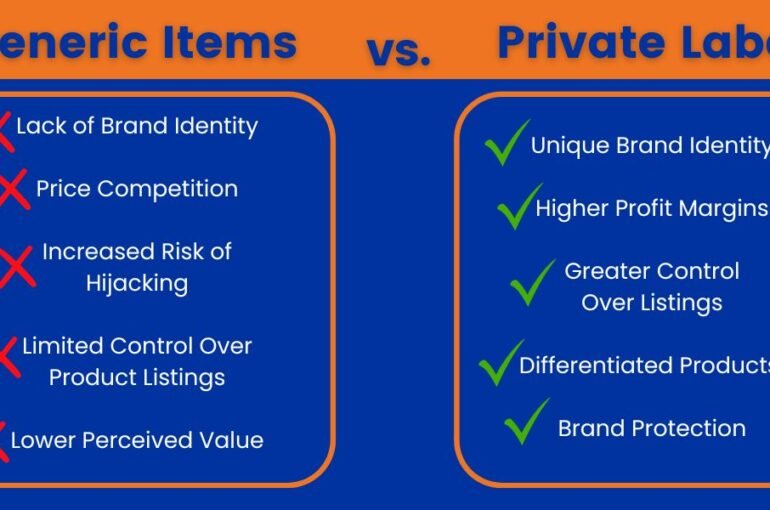Amazon Generic vs Private Label, Which Selling Model is Right for You?
Amazon Generic vs Private Label, Which Selling Model is Right for You?

If you’re considering selling on Amazon, one of the key decisions you’ll face early on is whether to focus on generic products or invest in building a private label brand. Both models have proven profitable for sellers, but they require different approaches, investments, and strategies. Understanding the differences will help you choose the best path for your business goals.
What Is Amazon Generic Selling?
Generic selling on Amazon typically means offering products that are widely available and not branded by the seller. These are often basic or commodity-type items—think phone cases, kitchen tools, or generic health supplements—that multiple sellers list under a single product page or “listing.”
Many generic sellers source products from wholesalers or manufacturers and list them with standard product titles and descriptions. They compete mainly on price and availability, without owning a unique brand or product differentiation.
Pros of Selling Generic Products
- Lower upfront investment: No need for branding, custom packaging, or marketing.
- Faster setup: You can list products quickly and start selling.
- Less risk: No need to commit to product development or brand reputation.
- Easy to test: Quickly try different product categories or trending items.
Cons of Selling Generic Products
- High competition: Many sellers often list the same item, leading to price wars.
- Low margins: Price competition often drives profits down.
- Limited control: You don’t own the listing or brand, so changes rely on Amazon or other sellers.
- Difficult to build loyal customers: Shoppers see the product as a commodity, not a unique brand.
What Is Amazon Private Label?
Private label selling means you create your own brand and sell products manufactured by third parties under your exclusive label. This involves designing unique packaging, developing branded listings, and investing in marketing to build brand awareness.
For example, instead of selling a generic silicone spatula, a private label seller might develop a branded line of kitchen tools with unique features and packaging, marketed as “ChefPro” or a similar brand.
Pros of Private Label Selling
- Brand control: You own the listing, branding, and customer experience.
- Higher margins: Branded products allow for premium pricing.
- Customer loyalty: Unique branding encourages repeat purchases and better reviews.
- Competitive advantage: Differentiation protects you from price wars and copycats.
- Long-term growth: Builds equity in a brand that can expand into multiple products or categories.
Cons of Private Label Selling
- Higher upfront costs: Product development, packaging, and branding require investment.
- Longer lead times: Designing and sourcing products takes time.
- Marketing effort: You need to invest in advertising and SEO to build brand awareness.
- More risk: If the product or brand doesn’t resonate, it can be costly.
Which Should You Choose?
Your choice depends on your budget, goals, and risk tolerance:
| Factor | Generic Selling | Private Label Selling |
|---|---|---|
| Upfront Investment | Low | Medium to High |
| Speed to Market | Fast | Slower |
| Control Over Product | Low | High |
| Competition | High | Lower (with good branding) |
| Profit Margins | Lower | Higher |
| Brand Building | No | Yes |
| Long-Term Growth | Limited | Strong |
Tips for Success in Both Models
- Generic sellers: Focus on sourcing quality products, optimizing listings, and competitive pricing. Use tools to monitor your competition and adjust pricing dynamically.
- Private label sellers: Invest in product quality, professional branding, and high-quality images. Run Amazon PPC campaigns and build an off-Amazon presence to grow brand awareness.
Final Thoughts
Both Amazon generic and private label selling offer viable routes to success, but they cater to different seller profiles. Generic selling is ideal for those who want a low-risk, quick-start approach, while private label appeals to entrepreneurs aiming to build a scalable brand with higher margins.
Many successful sellers start with generic products to test the waters and then transition into private label once they understand the market and gain capital. Whichever path you choose, focus on providing value to customers, maintaining excellent service, and continuously optimizing your approach to thrive on Amazon.
